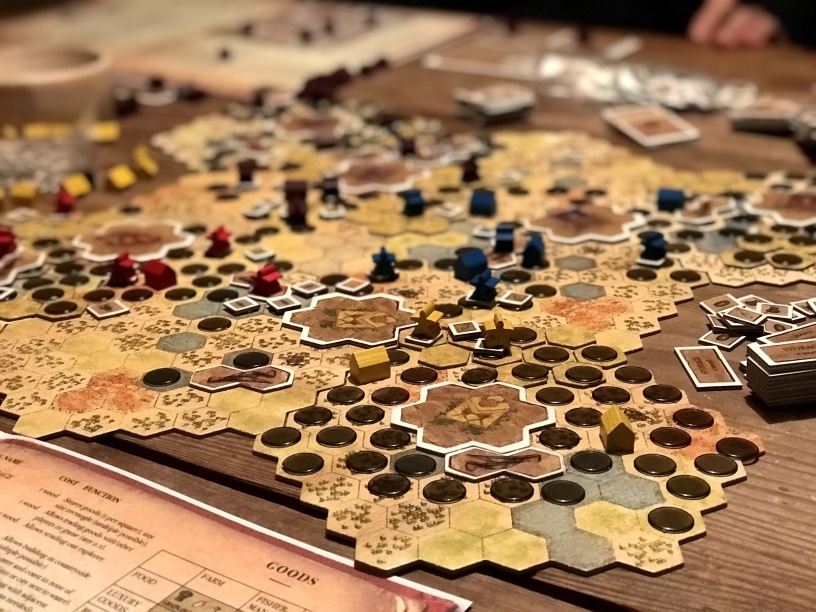Type: Race / Area Control
Time to play: 180+ minutes (Teaching: 20 minutes)
Best played with: 3-4 Player (2 – 4 Players)
Isn’t it incredible how you can explain a game fairly quickly but then it can take a much longer period to actually play through the expansive possibilities created by those rules. Okay, the rules aren’t that simple here, but you cannot get around the fact that they are succinct, well written and actually intuitive after you start to play a few games.
Antiquity, is a Splotter game – a game by a famous dutch publisher that has a flare for complexity, for strategy and for multiple paths to victory. Oh and one quick warning right now – they don’t believe in catch up mechanics, if you start losing there may be no way back.
The game is fairly unique in how it plays and your experience as a player. It’s a civilization builder in many respects; you build up multiple cities from a base point on the map. In each city, you have limited space and many (many!) buildings you can choose to build there. As you build out, you will be also be building farms and outhouses to your cities and spreading across the map.
However, this is a race – a race to achieve a victory goal that you define during the course of the game. The game will push you to rush towards victory, because if you don’t this game will consume you with famine and pollution. That’s how this also has elements of area control; pollution which fills the map either where you are or where you overlap with your opponent. Pushing pollution on to your opponent, or just expanding straight into their area is an important trick in this game to deny your opponent the space to grow whilst retaining your own space to build and thrive.
So where to start? A town on one edge of the map, with a few houses and six pieces of wood. From that you will build woodcutters, fishfarms, and mines. If you explore, you will get the chance to develop other farms. Keep planting new fields to get your economy and eventually build luxury resources and a new city. This game escalates as it requires lots of different resources to complete any of the objectives. Whether you are hoarding resources, developing houses or perhaps racing to cover your opponents land – you will need lots of resources and probably a very wide mix of them!
This game has got the potential to move very slowly, but one of the exciting things about this game is a relatively low down time for a heavy game if all players are willing to play simultaneously in the city development phase. Either secretly (as proposed) or openly (because it’s impossible to follow) you can develop the cities in parallel at the start of each turn. It’s the big planning step but you are all active.
Then, out to the fields – but realistically this is 2-3 moves per player. Building the outposts is tricky because of the number of pieces to place but it’s not a long process. Lastly, you harvest up the goods – simultaneously again! All that means that despite a daunting 10 step process you can (a) rattle through this and (b) stay active throughout.
By the end of this game you will have built an empire, and despite choosing different win conditions you will probably find that it’s a close run finish. You will also have the crushing feeling that the game has been growing in difficulty just to survive. No matter how much food you gather, or buildings you have – the space in the city is limited, the amount of land to farm is limited and the pollution is spreading. Now, some plays with science can help you avoid this and allow you to sustain your economy forever but I suspect that you are going too slow to win the game with that strategy!
Now, I have mentioned a few things above that are going to put people off – the weight of the game (length/complexity), the trickiness of the pieces on the map (see image) or indeed the very dry / simple / low production value (see picture!). This is a game for a very particular group of gamers but if you haven’t tried a Splotter game before but have played Civilization on PC then I would suspect that this is a good place to start.
The game is brutal and crushing (through famine and pollution), and there’s some frustration from players dumping pollution in your zone, but I think in the main this game is at the lower end of player interaction and more forgiving than other Splotter games (Food Chain Magnate and Indonesia for example!).
Last notes;
- If you like games with engine building and economies, this is a tough trial to learn
- If you don’t like a game where you can find yourself trapped into a corner of a crashing economy – maybe pass on this
- If you win, can you manage it with a different win condition?
